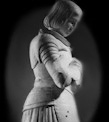

Joan of Arc Chat

SPECIALS
Top 10 Portraits
Screensavers
Devotionals
Rare Books
eBooks
Music

Email This Page
Don't forget to bookmark us! (CTRL-D)
|
 |
 |
|
|


 |
|
|
|
|
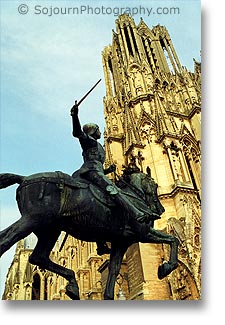 In
Four Months Time In
Four Months Time
Subject: Joan of Arc before Reims Cathedral
Location: Reims
Portrait:
purchase options
Then: "I
bring you news from God, that our Lord will give you back your kingdom,
bringing you to be crowned at Reims, and driving out your enemies. In this I
am God's messenger." Joan of Arc
Sometime in March of 1429, Joan professed to the Dauphin, Charles VII,
that in four months time he would be customarily crowned the King of
France in the cathedral at Reims. This claim is verified in a letter
dated April 22, 1429. He was crowned there on July 17, 1429. This is one of the
four prophetic responsibilities that Joan
laid upon herself. Now: Very busy areas
can be difficult to shoot if you don't want people in the picture.
Sometimes the best solution is to point the camera up. A quick walk
around the base of this monument while looking up revealed this
nostalgic angle showing Joan of Arc leading the march to the Reims
Cathedral. |
|
|
|
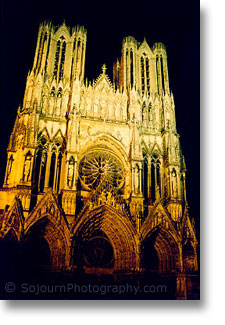 Out
of Darkness Out
of Darkness
Subject: Reims Cathedral
Location: Reims
Portrait: available upon request
Then:
"Four things are laid upon me; to drive out the English, to bring you to be
crowned and annointed at Reims; to rescue the Duke of Orléans
from the hands of the English; and to raise the siege of Orléans."
Joan of Arc
Until the mission of Joan of Arc commenced in 1429, the political
situation of France was looking very dark: the English were sweeping
through the country, the Burgundians were aligning themselves with the
English, Charles VII's legitimacy to the throne was in question, the
coffers of the Treasury were low and morale was even lower. Within the
year and a half of Joan's efficacy, she lifted the nation out of
darkness. It began with the victory at Orléans and was validated here,
at the Reims Cathedral Notre-Dame, when the Dauphin, Charles VII, was
crowned King of France. Now: The Reims
Cathedral has a long history of construction dating back to its small
original form called Our Lady of Rheims founded by Saint Nicasius in the fifth
century. It underwent three additions and sporadic construction through
the fifteenth century. World War I nearly destroyed the cathedral with
four years of bombing beginning September 19, 1914. It was heavily
shelled, fire destroyed the wooden scaffolding against the north tower,
shattered the statues, reached the roof and destroyed the woodwork.
Consequently, it is under constant reconstruction and preservation. One
of the nicest attributes of this photo of the west façade is the lack of
scaffolding. The marvelous detail (the church is adorned with more than 2300
statues) and symmetry is unobstructed. The tilt
of the photograph gives drama to the movement of the cathedral out of
the darkness of the bottom-left corner. |
|
|
|
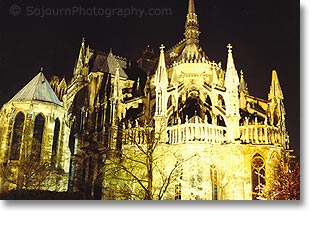 Coronation Coronation
Subject: Reims Cathedral
Location: Reims
Portrait: available upon request
Then: The "Bloodless March" is the most
extraordinary military campaign in history. After the lifting of the siege
at Orléans, Joan of
Arc led Charles the Dauphin on a long march from Gien to this cathedral in
Reims through English occupied territory, capturing every English town and
fortress that barred the road, from the beginning of the journey to the end
of it; and this by the mere force of her name, and without shedding a drop
of blood. Then Charles was traditionally and formally crowned King in July
of 1429 as all French monarchs before him since 1027. Now:
The flying buttresses, intense detail and veil of leafless trees over
the eastern ambulatory paint a wicked portrait against a black sky. At night, the
entire cathedral is cast in golden light and is a beautiful sight to
see. Bring extra batteries for those long shutter speeds. |
|
|
|
Portals of Reims Cathedral
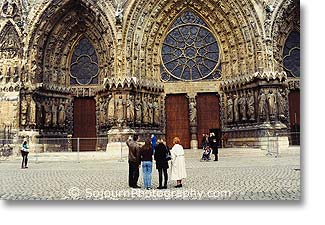 Subject:
Portals of west façade Subject:
Portals of west façade
Location: Reims Cathedral
Portrait: available upon request
Then: The devastation suffered by Reims
Cathedral is readily apparent. Much of the artistic iconography has been
removed and replaced by replicas for preservation. The remainder is
generally under a constant state of restoration. The stained glass, however,
such as the "small" rose window of the litanies of Mary above the central
portal (on the right) are exceptionally preserved and vibrantly beautiful.
The "great" rose window and the windows of the choir are nothing less than
intense. Now: The immense
size of the west façade (243 feet, 81 meters) is overwhelming. It makes
you feel so small! These portals are merely the bottom 25% of the
overall height, yet the intricate detail is fascinating and can keep you
gawking for hours! |
|
|
|
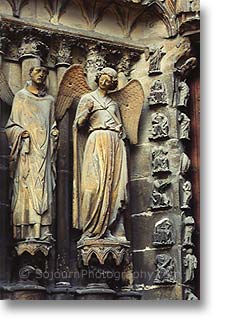 Smiling
Angel of Reims Smiling
Angel of Reims
Subject: Sculptures of the west façade
Location: Reims Cathedral
Portrait: available upon request
Then: The Angel of the Smile has become an
icon of Reims. The Cathédrale Notre-Dame of Rheims is also the only medieval
cathedral to show an angel with outstretched wings. The statue to the left
of the angel is believed to be Saint Denis. Notice the statuettes lining the
doorway on the right? They are all headless! During the Revolution of 1789,
the new Republic defiled the church by beheading many of the decorative
figures. Now: Often times areas such as
this one are restricted for restoration or preservation. To photograph
them, be sure to bring telephoto lenses, converters, etc. |
|
|
|
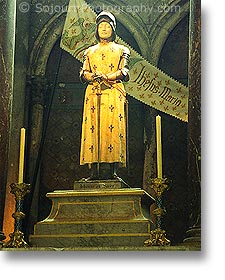 Jehanne
au Sacre Jehanne
au Sacre
Subject: Joan of Arc
Location: Reims Cathedral
Portrait: purchase options
Then:
"Why was it that your
standard had place at the crowning of the King in
the Cathedral of Rheims?"
"It had borne the burden, it had earned
the honor."
Saturday, March 17, 1431,
Trial of Condemnation Now:
This portrait honors her bravery, faith and conviction by rightfully placing her
upon a pedestal to be venerated as "Holy Joan". A scale replica of
her banner is proudly displayed behind her. |
|
|
|
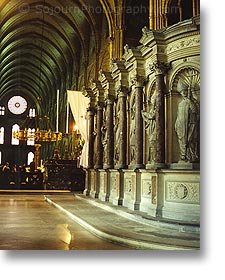 Tomb
of Saint Remi Tomb
of Saint Remi
Subject: Tomb and nave
Location: Reims Cathedral
Portrait: available upon request
Then: Clovis
(481/482?-511) is known as the first King of the Franks. He conquered
tribes in most of present day Germany and France through warfare
supported by the Roman Empire. He was baptized a Catholic in 496 by
Saint Rémi (aka Saint Remigius), archbishop of the region. Under Clovis,
the Franks became Catholics. Now:
Interestingly, while we were visiting Our Lady of Rheims Cathedral, the
majestic naves and apses were filled with the cry of a child being
baptized. I tried to capture the duality by shooting this photo of the
tomb of Clovis with the procession of the baptism in the background.
Interestingly still, our good friend and gracious hostess is a native of
Reims and was also baptized here. Her amazingly kind and outstanding
parents still live there today. |
|
|
|
|
CROWNING THE KING IN RHEIMS
Following the baptism of Clovis by
Saint Remi, the kings of France gradually began to make the journey to
Rheims to be anointed by the Archbishop with chrism from the Holy
Ampulla.
For the Christian world of that
period, all power was in the hands of God, who delegated part of it to a
man. "The King is the lieutenant of Jesus Christ in temporal matters,
just as the Pope and the bishops are in the spiritual sense". Through
the rite of coronation, he received the grace to accomplish his mission:
to rule is to serve.
The anointing with the holy oil links
the King of France to the kings of Israel and especially to David. He is
above all the sovereign of the New Covenant who is to lead another
chosen people, the Franks.
From 1027 onwards, all the kings were
crowned in Rheims with the exception of Louis VI and Henry IV. After the
Revolution, only Charles X received the sacrament in 1825.
On the day of the ceremony, everyone
would congregate in the Cathedral early in the morning. With his hand on
the Gospel, the Prince would swear to respect justice and law and to
defend widows and orphans. By the presenting of the spurs and the sword,
he became the first of the knights. Then followed prayer and the nine
anointings which consecrated him as King. He received the symbols of
royalty: the cloak and ring, the scepter and the hand of justice. Then
came the coronation and enthronement, the homage of the peers and
general rejoicing.
|
|
The 25 Kings of France Crowned in
the Present Cathedral
|
|
1223: |
Louis VIII the Lion |
1461: |
Louis XI |
| 1226: |
Saint Louis
IX |
1484: |
Charles VIII |
|
1271: |
Philippe III the Hardi |
1498: |
Louis XII |
| 1286: |
Philippe IV
le Bel |
1515: |
Francis I |
|
1315: |
Louis X le Hutin |
1547: |
Henry II |
| 1317: |
Philip V le
Long |
1559: |
Francis II |
|
1322: |
Charles IV le Bel |
1561: |
Charles IX |
| 1328: |
Philip VI of
Valois |
1575: |
Henry III |
|
1350: |
John II the Good |
1610: |
Louis XIII |
| 1364: |
Charles V |
1654: |
Louis XIV |
|
1380: |
Charles VI |
1722: |
Louis XV |
| 1429: |
Charles VII |
1775: |
Louis XVI |
| |
thanks to Joan of Arc! |
1825: |
Charles X |
| |
|
|
|
|
|
|
Caves of Castellane
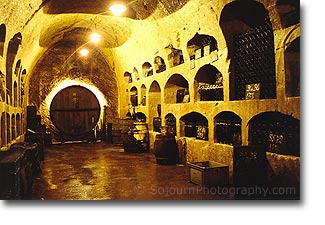 Subject:
Champagne cellar Subject:
Champagne cellar
Location: Épernay
Portrait: purchase options
Then: While champagne was not the beverage
of choice in Joan's era, wine certainly was. Épernay and Reims are part of
the larger region known as Champagne, producers of the most renowned
champagnes in the world, such as Dom Perignon and Ruinart. Now: Épernay is the champagne capitol of the world. There are
hundreds of
miles of underground caverns properly storing champagne and wine. Tours
are readily available and can be very photogenic. |
|
|
|
|

Website design by Sojourn
Photography
|
|